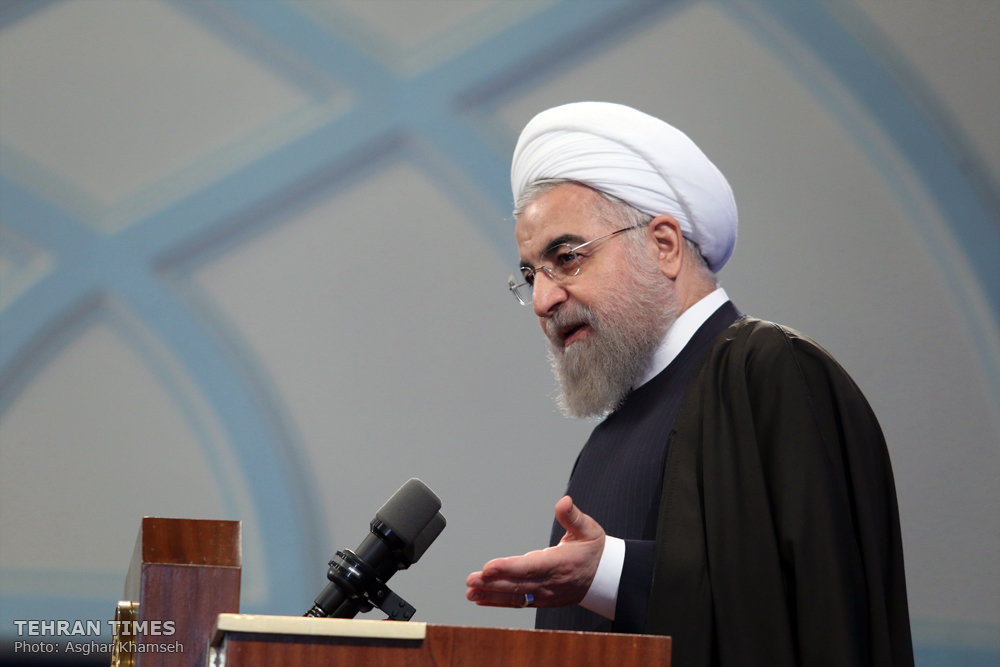Strong national growth buys bargaining power: Rouhani

TEHRAN – Emerging victorious from a nuclear pact, an OPEC output freeze, and a recent deal with Boeing, President Hassan Rouhani underscored in comments on Monday that a stronger domestic growth scaffolds the country’s bargaining power in the international arena.
“Our bargaining power in OPEC talks was due to an increase in our oil output,” Rouhani said on Monday.
The president was making the comments at the “Harvest Festival,” held in Tehran to celebrate self-sufficiency in agricultural products, particularly wheat.
There is a bit of background to Rouhani’s remarks.
The past two years have been record years for Iran in the international scene. In July 2015, Iran and six world powers reached an agreement on a decade-long nuclear debate, resulting in removal of sanctions against Tehran in exchange for a limit on its nuclear program.
Emerging from the economic pressure, the country’s oil sector reveled in a long-awaited-for euphoria, lost in recent years under Western sanctions tied to Tehran’s nuclear program.
Rouhani says self-sufficiency in agricultural products boosts national power and sustainability, sovereignty, and our bargaining power.
Victorious moments for the country’s energy sector culminated in late November after OPEC, after years of trying fruitlessly to prop up energy markets, finally reached a consensus on production cuts.
The agreement was seen by many experts a blow to Saudi Arabia and a victory for Iran, which secured a pre-sanctions output level.
“When workers, engineers, and officials of the country’s oil industry are able to raise oil output from one million barrels in 2015 to 2,300 million barrels only 10 months after implementation of BARJAM (the nuclear deal), it means bargaining power in the sector,” Rouhani said of the OPEC freeze deal.
To top it all off, Tehran announced on Sunday it had finalized a $16.8 billion deal with Boeing to purchase 80 passenger planes in what came to be the biggest agreement to be struck with an American company since the 1979 revolution.
Robust agro sector builds into national security
Elsewhere in his remarks, Rouhani paired grains of wheat with pressures from a hostile enemy, saying food security works toward national security.
“The older ones who remember the starvation during World War II can appreciate what food security means,” he said, adding, “They know what happens if the enemy puts pressure on us while we’re short on wheat.”
Tens of thousands of Iranians died of famine during World War II as Iran was occupied by Britain and the Soviet Union which believed German spies were sheltering in Iran.
Iran’s agricultural output has increased from nearly 97 million tons in 2013 to 117 million tons in 2016, with wheat reaching a record high.
In 2016, the government purchased more than 11.5 million tons of wheat from farmers, eating into half of the country’s annual construction budget, Rouhani explained out.
“Today’s celebration is an international honor for the agriculture sector,” Rouhani stated.
In 1999, the government initiated the self-sufficiency strategy for wheat by increasing production through input subsidies and the adoption of new methods and technologies such as improved seeds, mechanization, and farmer training.
When this strategy was launched, Iran was the 16th largest wheat producing country. By 2012, according to FAO, Iran had become the 12th leading producer of wheat in the world.
Iran had earlier announced to have set the goal of achieving self-sufficiency in essential crops as well as animal products by the end of the fifth five-year development plan (2011-2016).
Food security exists when all people, at all times, have physical, social and economic access to sufficient, safe and nutritious food which meets their dietary needs and food preferences for an active and healthy life, according to the Food and Agriculture Organization of the United Nation.
“Self-sufficiency in agricultural products boosts national power and sustainability, sovereignty, and our bargaining power,” Rouhani asserted.
Continued independence in the agriculture sector is threatened by low precipitation and out-of-date technology, what Rouhani was mindful of.
It is hoped that an international nuclear deal Iran and six world powers finalized in 2015 results in better agriculture performance, considering re-engagement with the global economy and access to cutting-edge technology.
AK/PA
Leave a Comment